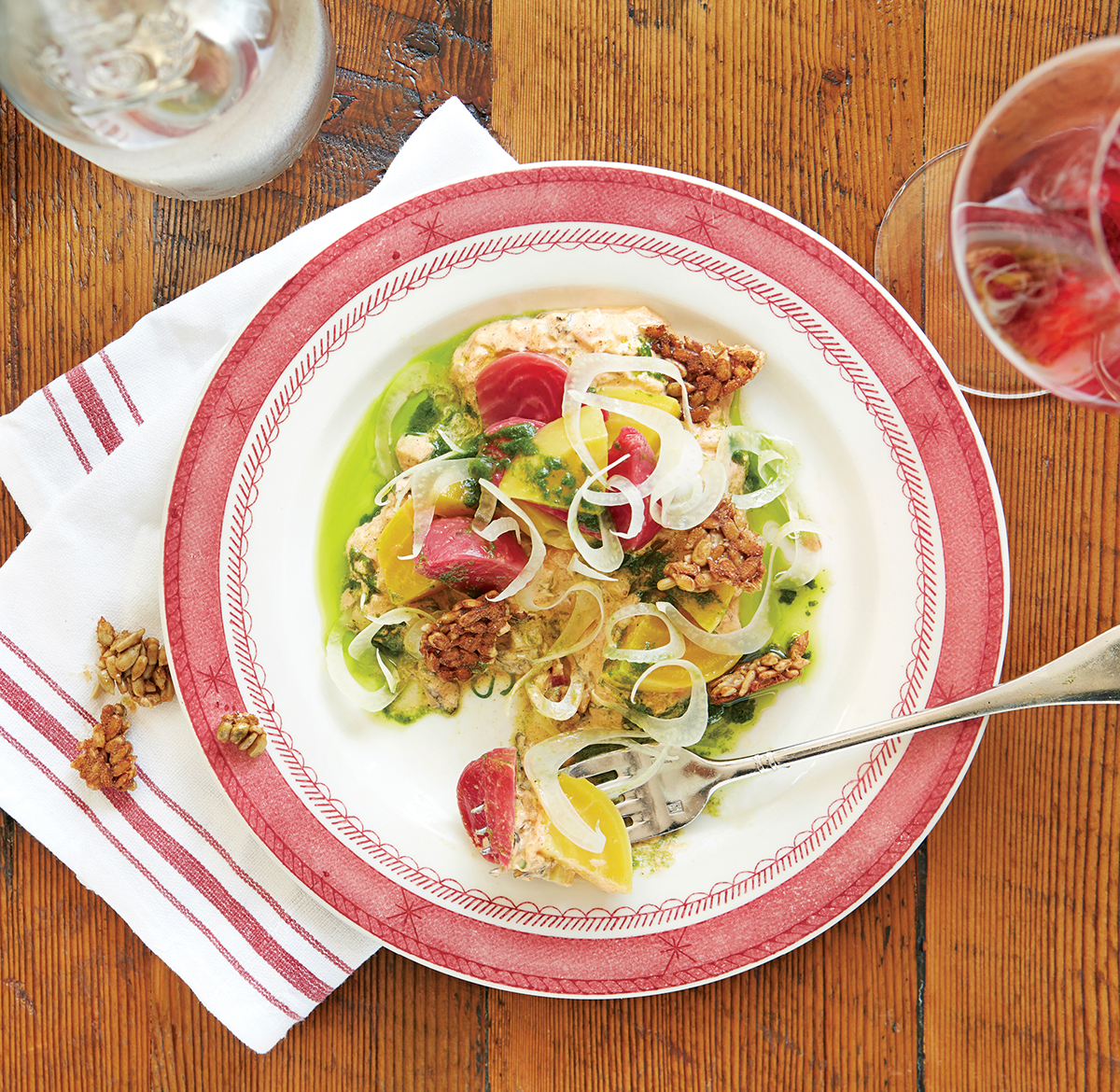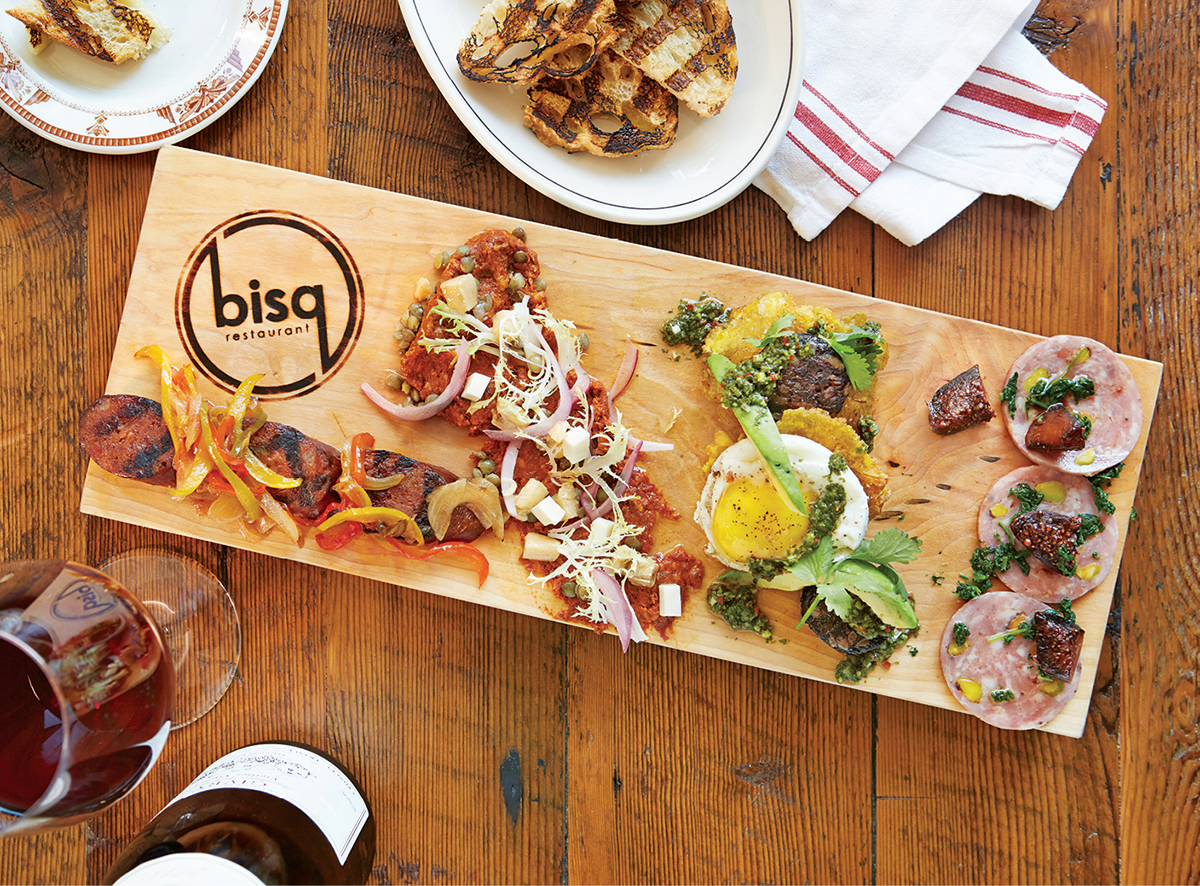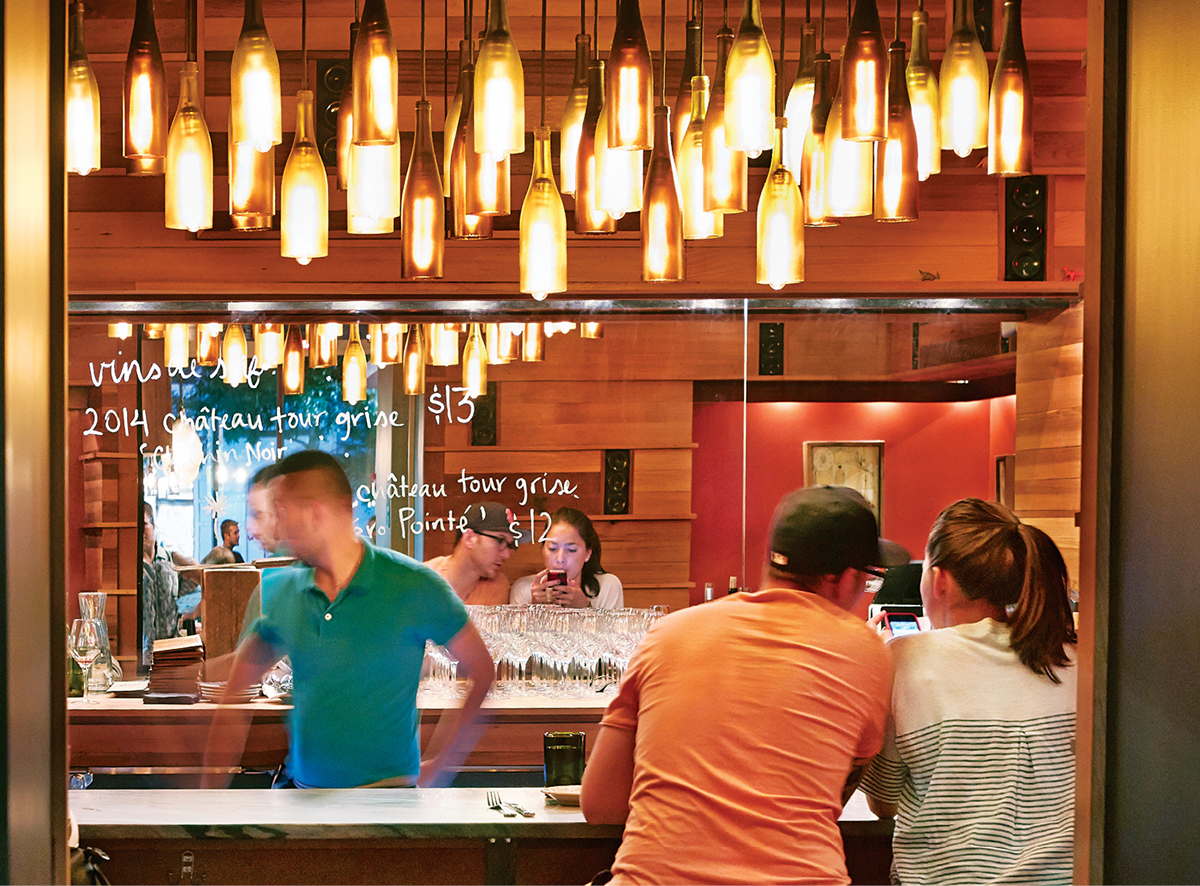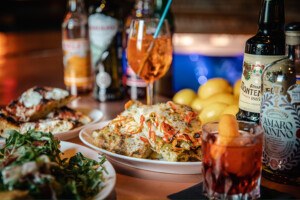Restaurant Review: Bisq

Herb-marinated beets topped with sunflower-seed granola, red onion, and cucumber raita. / Photograph by Nina Gallant
Bisq, the new Bergamot offshoot in Inman Square, is first and foremost an intimate wine bar with a very serious list, unusually rich in cru Beaujolais and rare German bottles. The décor, too, emphasizes the vino theme: Wood paneling is meant to evoke wine crates at the tiny, lively bar in the back, and a panel of translucent bottle bottoms, located behind the check stand, reaches into the ceiling. The surprise is the food, a menu focused on small plates and charcuterie.
The restaurant’s position next to Clover, a business that has seized the locally sourced zeitgeist, is apt. Around the same time that company rolled out its first organic, vegetarian food truck, Bergamot’s Keith Pooler and Servio Garcia were charting their own new territory with idiosyncratic flavors that said, “Forget what you’ve been eating anyplace else—I have something much more interesting.” It was a growing movement of progressive culinary pioneers such as T. W. Food, where Tim Wiechmann imposed his Swiss-German roots on what was becoming rote farm to table. Then Alberto Cabré added Puerto Rican and Colombian fare with Casa B, in Union Square. The Latin-American theme continued at Somerville’s La Brasa, where chef Daniel Bojorquez overlaid his Mexican heritage on the zero-kilometer ethos of his farm-owning partner, L’Espalier’s Frank McClelland.
At Bisq, the influence is Peruvian, the home country of chef Dan Bazzinotti’s wife. The spirit of the menu, though, is closest to the sweet/spicy/herbaceous combinations of Bergamot, where Bazzinotti honed his skills as sous chef. I felt positively comforted by Bisq’s “garde-manger” section of the menu, with its many echoes of Bergamot’s light, herb-and-sweet-themed whimsy in dishes like the green gazpacho with smoked almonds, crème fraîche, and cornbread crumble ($8); sunflower-seed granola strewn over herb-marinated beets ($7), the honey and cinnamon in the granola providing a breakfast-y counterpart to the red onions and lime in the cucumber raita; and an heirloom tomato salad ($12) with tomato molasses and a ginger-garlic-lime XO sauce, a vegetarian version of the Hong Kong classic. Ah, I thought, the Bergamot palate!

A sausage board loaded with morcilla, zampone, and spicy ’nduja. / Photograph by Nina Gallant
Where Bazzinotti really lets loose is on his charcuterie selection, which is as distinctive as the sausages and terrines that Joshua Smith is creating at the Backroom at Moody’s, in Waltham. Eating at both restaurants, in fact, helps you understand just how versatile a medium chopped and ground meat can be. Bazzinotti coaxes out flavors I found more subtle and seductive, but that might be because I’ve grown into the Bergamot aesthetic.
Morcilla ($9), for instance, is something chefs feel compelled to make: blood sausage that is always surprisingly sweet and squeamishly mushy. Bazzinotti achieves a reassuringly firm texture thanks to the addition of pork along with the traditional rice stuffing. He also puts in more garlic and savory spices than the usual Spanish version—a welcome change in a kitchen that routinely adds so many sweet notes.
The morcilla was the best sausage on the menu, but that might have been because the chef seems to take a Noah’s Ark approach to categories of charcuterie like salami, pâté, sausage, and mousse (a runny, lovely chicken liver, $7). Two items easily rose to that level: chicken-and-duck galantine ($12), which had big chunks of meat, served unusually hot and crisped; and zampone ($9), a surprisingly delicate rendition of the Emilia-Romagna specialty. Like its cousins bologna and mortadella, zampone is emulsified with milk powder, but mixed with dried apricot, pistachio, and spices like mace and cinnamon, touches meant to evoke a Christmas roast, Bazzinotti told me. It’s so light and served in rectangles so thin that it felt more haute cuisine than holiday, especially with its dressy accompaniment of baked goat cheese rounds and pickled figs.
Other meats were lustier, or as lusty as an essentially light and subtle instinct will take this chef: ’nduja ($9), the spicy Calabrian sausage that here is more smoky than peppery (it tastes like lapsang souchong, unexpectedly potent but leaving you wanting more); “Betty’s mazzafegati” ($7), an Umbrian-style pork-liver-and-shoulder sausage re-created from the recipe of a cook who once worked with Bazzinotti. Even the whipped lardo ($6), flavored with ancho, salt, and lime juice, felt oddly ethereal—maybe because Bazzinotti served it with fresh strawberries and a barely savory shortbread. It’s more of that Bergamot whimsy, and I liked it.

Wood paneling at the bar is meant to evoke wine crates. / Photograph by Nina Gallant
The “Bazz hook-up board,” a chef’s selection, is worth the $26 investment no matter what the chef wants to send out. The “farm and field” section of the menu, though—the closest thing to a selection of entrées—is a bit less predictable, and where the Bergamot-style eccentricities become a bit more obtrusive. Cherry-glazed lamb ribs rubbed with a cumin-and-coriander-based chermoula spice blend ($16) were an unconvincing example of that sweet-spicy mix, mainly because the ribs were so underflavored and fatty. Eggplant cappellacci ($13) with corn, tomato, vegetable broth, and pistou sounded seductive, but the pasta was undercooked and tough. And corn bisque ($13; not “Bisq,” which stands for Bergamot Inman Square) was a shallow, starchy pool of chowder with a not-quite-compatible set of ingredients: red gooseberries, seared scallops, chanterelles, and cilantro flowers.
Other plates succeed with their levity. King-oyster mushroom carpaccio ($12) wasn’t really even a carpaccio, with grilled, thin-sliced mushrooms that were far from raw. But the grilling was expert, and the odd-fellow collection of ingredients—queso verde, red cabbage, peanuts, omelet (sweet), and (sweetish) soy-ginger vinaigrette—somehow enhanced the mild-flavored mushrooms. Tomato-braised summer squash ($8) with egg and Parmesan was a surprisingly hearty, appealingly sloppy stew that read as pasta sauce—which is, in fact, how Bazzinotti’s Sicilian grandmother used it. If you want protein beyond the charcuterie list and don’t mind it cold, look to the front of the menu rather than the “farm and field” meats. Both ceviche ($7) and salmon tiradito ($12) were refreshing and acidic, each topped with a crunchy grain typical of South America: cancha (roasted corn kernels) on the ceviche and toasted quinoa on the tiradito. Bazzinotti has a knack for getting a great deal of flavor from simple fish and vegetables.
And from charcuterie. Bisq is not only a serious wine bar, but also a serious restaurant—one with a leavening touch of whimsy.
MENU HIGHLIGHTS
Zampone • $9
Morcilla • $9
Herb-marinated beets • $7
King-oyster mushroom carpaccio • $12
1071 Cambridge St., Cambridge, 617-714-3693, bisqcambridge.com.
Critic Corby Kummer—an editor at the Atlantic and author of The Pleasures of Slow Food—has been reviewing Greater Boston’s top restaurants in our pages since 1997.


